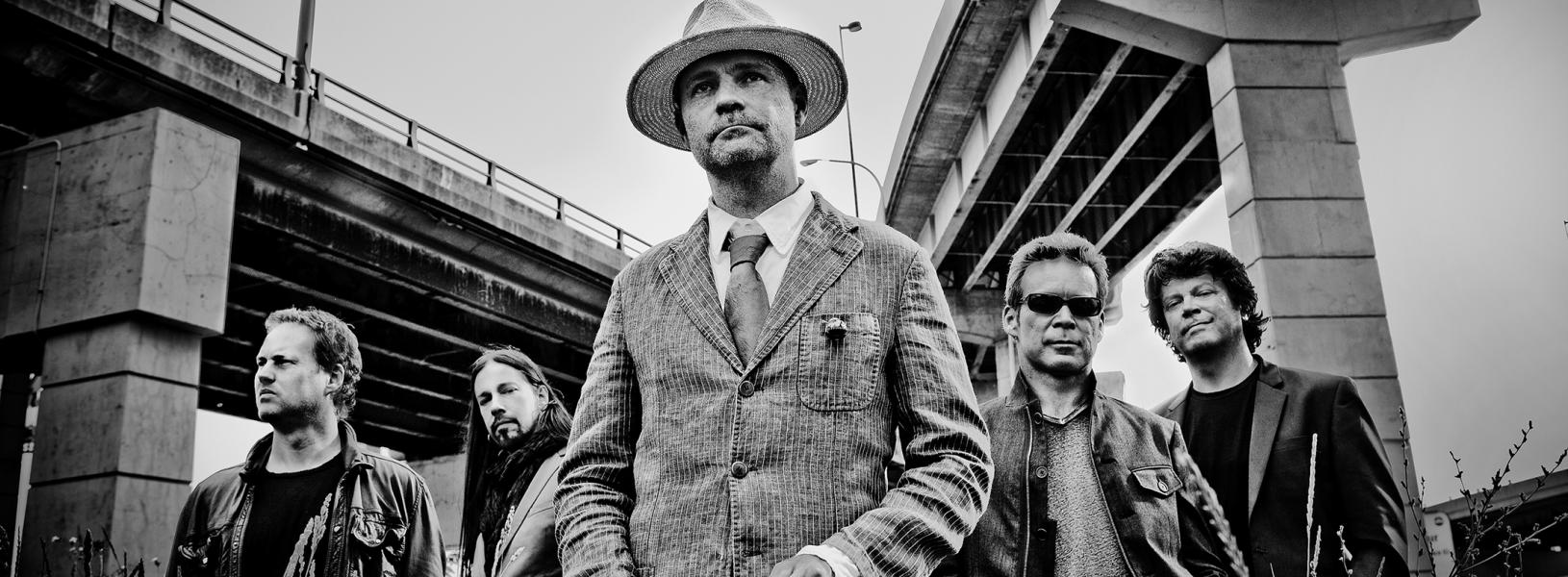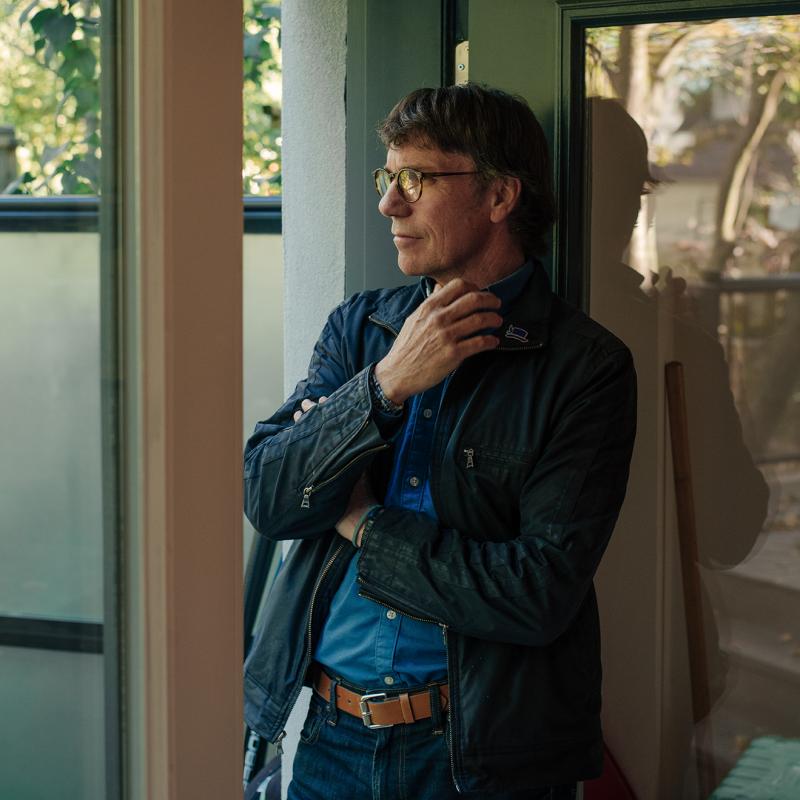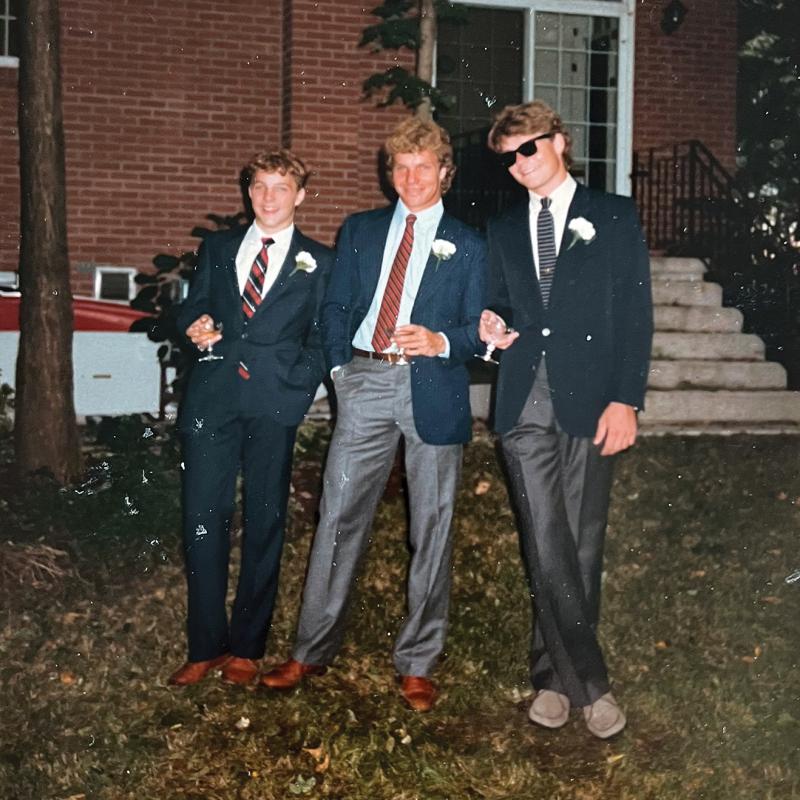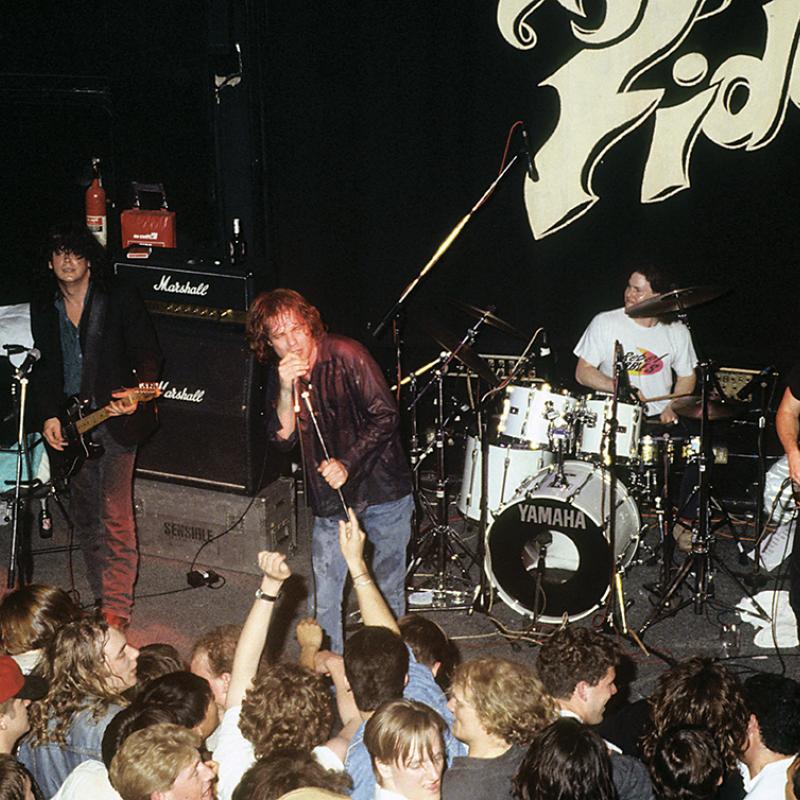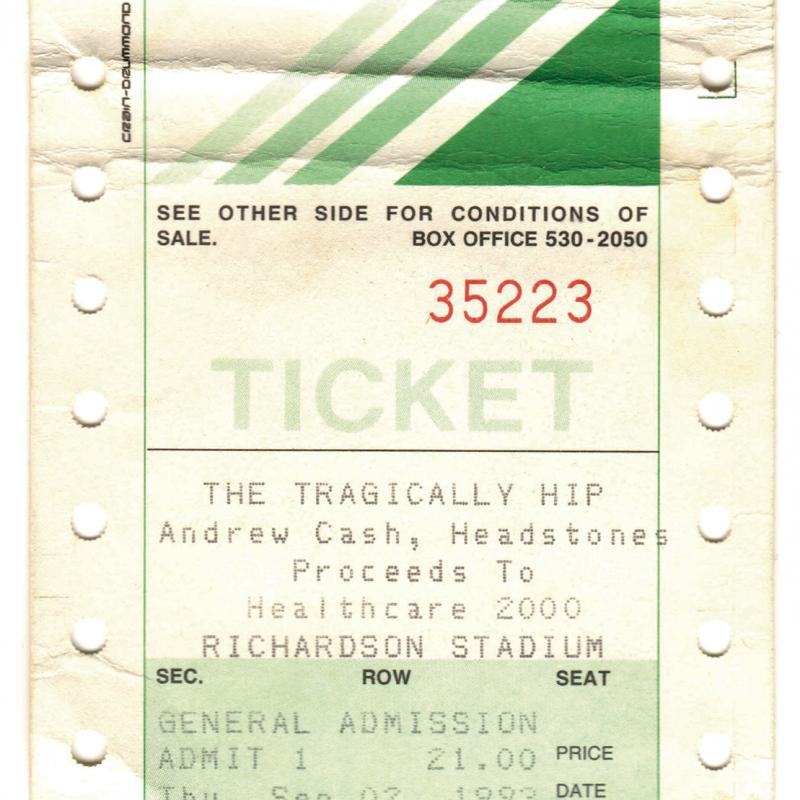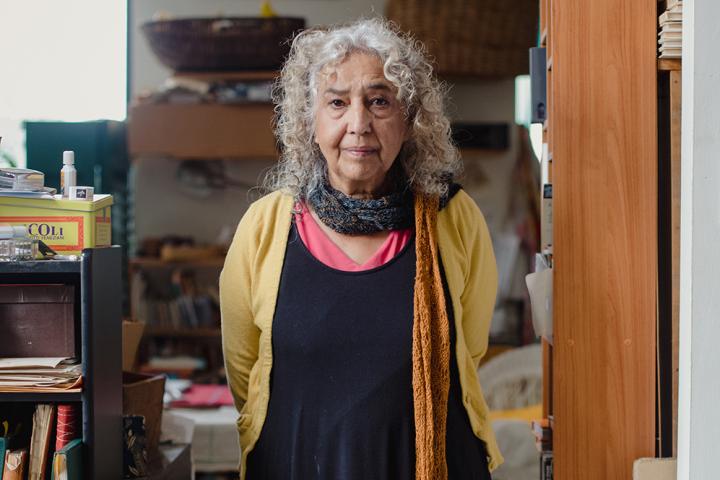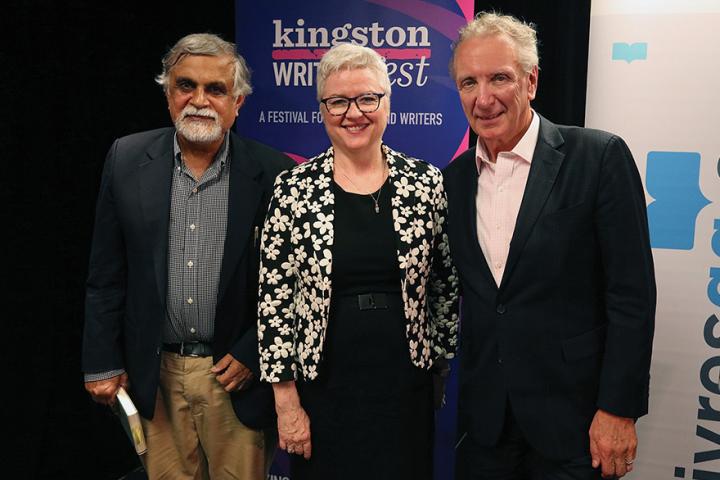They never wore kilts, didn’t play at football games, and if ever they marched, it was most assuredly to the beat of their own drummer.
If you were in Kingston anytime from the mid-1980s to the early ’90s, there was only one “Queen’s band” and that was Gord Downie and the Tragically Hip. Maybe you saw them at the Clark Hall Pub, or soaked in sweat from a packed dance floor on a Saturday night at the Manor. Gord Downie, Artsci’87, and fellow Queen’s students Gord Sinclair, Artsci’86, LLD’16, and Rob Baker, BFA’86, LLD’16, along with two other Kingstonians, Paul Langlois, LLD’16, and Johnny Fay, LLD’16, were the soundtrack of your university years.
Even after success took the band to Toronto and eventually around the world, there was never any doubt that the Tragically Hip was a Canadian band. A Kingston band. A Queen’s band. “I meet people today and they say to me, ‘I remember you telling me, “Meet me at Alfie’s. My brother’s band is playing and they’re great,” says Mike Downie, a documentary filmmaker and Gord’s older brother.
“That’s a nice feeling. I was so proud of them. They were just a bunch of guys playing at a Queen’s pub, but I was already a devotee. I just wanted people to see them.”
Nearly 40 years later, Mike Downie still wants people to see his kid brother’s band. He’s making a four-part documentary about the Hip – from Gord’s childhood and high school years at Kingston Collegiate and Vocational Institute (KCVI), through to the Hip’s national and international stardom and the searing final concert at Kingston’s K-Rock Centre (now Leon’s Centre) in August 2016, 14 months before Gord Downie’s death from brain cancer at age 53. The series will air on Amazon Prime in the fall of 2024.
“Our Queen’s ties are very strong. Funny how the years go by and, going back there, it seems not much has changed. It’s a nice feeling to be back on campus. I like it a lot.”
“We are telling the story of the five members of the band, right from the beginning, and their Kingston roots when they were performing as a couple of different high school bands that slowly morphed into what becomes the Tragically Hip,” Mike Downie says. “And we follow that career path all the way through until the very end, past that last concert and up to today and the various legacy projects.”
Though many films have been made of the Tragically Hip’s concerts and tours, no one has ever told the full story.
“A documentary about the Hip’s definitive story has never been done,” Mike Downie says. “This is the full telling of the Tragically Hip. And in telling their story, it’s also telling the story of this country and why this band meant so much to so many Canadians.”
No one has had a better seat for that story than Mike Downie himself. He and Gord shared a bedroom when they were growing up in Amherstview, with a toboggan hill outside their back door and a frozen swamp for playing hockey.
When the boys were teens, the Downies moved into Kingston to a house on King Street West and Gord’s life changed.
“We came into Kingston and, all of sudden, hockey was out and music became everything. His good friends were all musicians. It was something to experience.”
Gord Downie was in a KCVI band called the Slinks. Gord Sinclair and Rob Baker’s band was called Rick and the Rodents. Eventually, they came together to form the Tragically Hip in 1984. They took the name from a TV comedy skit.
Of course, being in Kingston put the band in Queen’s orbit.
“We were surrounded by Queen’s. We walked past Queen’s every day to get to KCVI.”
After high school, Gord enrolled in film studies at Queen’s. Mike, a year ahead, was a self-described “meds keener” in life sciences. In Gord’s case, the lecture hall took a back seat to the stage. For Mike, going to Hip shows was a way to blow off steam from his studies.
“I went to every show that I could – at the Manor, at the Commodore – all the Kingston shows,” Mike says.
Mr. Baker and Mr. Sinclair also attended Queen’s. Mr. Sinclair’s father, Duncan, was dean of Medicine.
Mike Downie’s bonds to the school run deep. It’s where he met his wife, Caroline Irving, Artsci’87, and three of their five children went to Queen’s: son Noah graduated in 2020, while Will is studying film and Cate is in life sciences.
“Our Queen’s ties are very strong,” Mr. Downie says. “Funny how the years go by and, going back there, it seems not much has changed. It’s a nice feeling to be back on campus. I like it a lot.”
For Gord and the Hip, however, it soon became apparent that they were outgrowing the university scene.
“While he was at Queen’s, the band just kept getting bigger and bigger. I think my parents were pretty concerned. At a certain point he had to say, ‘Look, basically I’m not going to university so I might as well just start doing music full time.’ Which he pretty much already was.”
Mr. Downie has plumbed his family’s archives and relied on the collections of other band members to tell much of that part of the story, but material is sparse from the band’s beginning.
“We definitely have some scarcity in the early days. In the ’80s, people didn’t have cellphones. But we do have some really interesting pieces, including several pieces that have never been seen before,” he says.
“Once you get into the early ’90s and they’ve become a national band being interviewed on MuchMusic, then all of sudden there’s quite a bit more material.”
“You can’t take your eyes off him. Whenever I saw him on stage, wherever I was, I couldn’t help but elbow the person beside me and say, ‘That’s my brother up there.’ I was always so proud.”
Mike Downie filmed a lot of those shows himself during the band’s early tours. He credits his 1993 documentary Heksenketel for getting him his start as a producer at CBC. He shot 70 hours of video for the documentary and used just a fraction of it. The outtakes have proved to be a treasure trove.
“You use maybe five per cent of what you shoot. Then when you look at it all these years later, you wonder, ‘Oh! I wonder why we didn’t use that. That stuff’s great.'”
Even now, Mr. Downie marvels at his brother’s showmanship and his ability to keep his audience riveted. He was always a good dancer, he says, but his captivating stage presence is a gift found in just a few performers – Jagger, Mercury, Morrison, Downie.
“You can’t take your eyes off him,” Mr. Downie says. “Whenever I saw him on stage, wherever I was, I couldn’t help but elbow the person beside me and say, ‘That’s my brother up there.’ I was always so proud.”
And, of course, there were the words, the lyrics and poetry that set Hip songs apart from other rock ’n’ roll bands. Word-perfect stories flowed from Gord mid-song like a shaman’s chant. Hip fans know them by name: Whale Tank; Double Suicide…
“They are extraordinary. There’s a story with a beginning, a middle, and an end. And it’s like they’re ripped from the headlines of the day,” Mike says. “We captured a couple of them. Some of them he only did once and never did again. They can be five minutes long and when you hear them, you’d swear that he memorized it – which he didn’t. They’re word-perfect. He’s 29 years old. It looks like he’s in the most comfortable place he could be. Like he’s sitting in his backyard.”
Gord and the Hip rolled on, album after album, honour after honour. Seventeen Junos, induction into the Canadian Music Hall of Fame, the Governor General’s Performing Arts Award, the Order of Canada. In 2017, Queen’s made him Dr. Downie by bestowing Honorary Doctor of Law degrees on all the members of the band.
Mike Downie was there for the ride. In addition to the Heksenketel documentary, he shot videos for the band, including one of the most Canadian of all Hip songs, Bobcaygeon. He also did the video for Poets, shot in Kingston’s Elm Street “cat house,” then in the news because of its owners’ collection of stray cats, some 300 in all.
The brothers were taking in a concert at Toronto’s Horseshoe Tavern when Gord leaned over, shouting to be heard above the band.
“He said, ‘I’ve got an idea for the Poets video,’” Mike recalls. “‘I want to do it in the House of Cats.’ I said, ‘I’m allergic to cats.’ And Gord said, ‘So am I!’”
When Gord was diagnosed with incurable glioblastoma in December 2015, the brothers were already working on the project that would become Gord’s legacy.
The Secret Path tells the story of Chanie Wenjack, a 12-year-old Ojibwa boy who froze to death in 1966 while he was running away from the Cecilia Jeffrey Indian Residential School in Kenora, Ont.
The 10-song album and companion graphic novel by Jeff Lemire were released on the 50th anniversary of Chanie’s death. The Gord Downie–Chanie Wenjack Fund is now the largest reconciliation fund in the country. It supports more than 6,000 schools by providing resources not only to teach about residential schools, but also to bring “the treasure of Indigenous knowledge and Indigenous culture” to students, Mike Downie says.
“Gord cared about a lot of causes, but none more than the one he put his name on.”
Mike Downie hopes his documentary will answer many questions, like the one so many fans have asked: Why didn’t the Hip make it big in the U.S.?
“I can’t wait to get into the editing suite about that,” he says. “They had great success in the States. People think, ‘Yeah, but they didn’t play hockey arenas.’ But most bands don’t. Justin Bieber does. If you want to be a pop star you play arenas, but this isn’t a pop band. This was a rock ‘n’ roll band. They put out albums, they did not chase pop hits.”
“Gord was never without a notebook. He wrote down everything. A lot of them are just a little turn of phrase or something that he sees. Things that occurred to him. They start in the ’80s and he wrote in them right up until he couldn’t do it anymore."
What Gord Downie did chase was connection. Connection to his audience. Connection to people he met. Connection to big Canadian stories – and the experiences of everyday life.
Mike and brother Patrick Downie have all Gord’s notebooks, small black ones he carried in the hip pocket of his jeans. They’re an astonishing window into Gord’s world, his thoughts, and his inspirations.
“Gord was never without a notebook. He wrote down everything. A lot of them are just a little turn of phrase or something that he sees. Things that occurred to him. They start in the ’80s and he wrote in them right up until he couldn’t do it anymore.
“When you go through them, you’ll see a line and think ‘I wonder what that is?’ Then you’ll see a line, ‘The fingernails scratching on my hull.’ That’s a line in Nautical Disaster. That’s where it came from.
“These notebooks make you realize he was a receiver. He paid attention to all those conversations. People tell me that all the time. ‘Your brother was such a good listener. He made me feel important.’ He had this ability to be in the moment.”
Mr. Downie hopes his brother’s notebooks will one day be available in university archives for academics to study, ideally at Queen’s. Some schools already teach courses on the Tragically Hip lyrics, he says.
Still, seeing his brother’s life with such intimacy is sometimes overwhelming.
“It’s not uncommon for me to just break down in tears. It’ll just be something,” Mr. Downie says, his voice cracking, “and you think, ‘God. I can’t believe he’s gone…’
